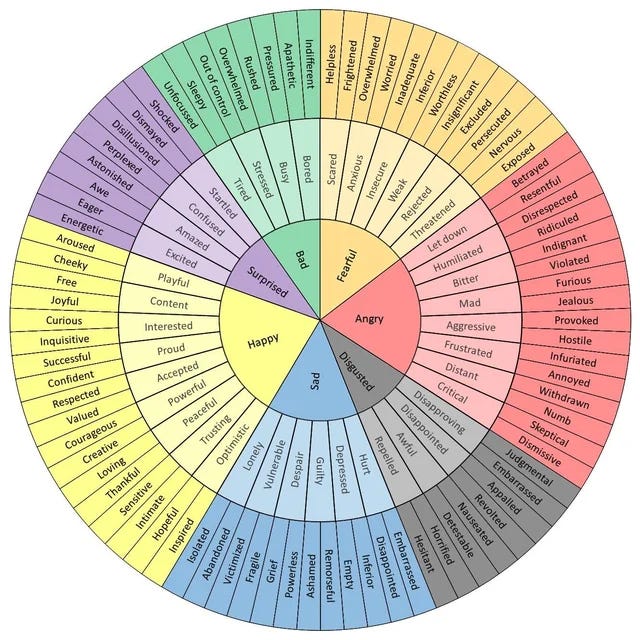Having previously written a basic biblical theology of emotions, I wanted to follow up with a practical guide for exercising self-control over our emotions.
Getting Drunk on Your Emotions
“Self-control” is the last of the fruit of the Spirit (Galatians 5:23). Similarly, the scriptures command us to be “sober-minded.” First Peter 4:7 says both. It says, “The end of all things is at hand; therefore be self-controlled and sober-minded for the sake of your prayers.”
The opposite of “sober-minded” would be “drunk-minded.” When you’re drunk on alcohol, you have less control over your mind and body. The same can happen with your emotions. When you’re mentally or emotionally drunk, you are not being “sober” with your thoughts and emotions. This is what Paul means in Ephesians 5:18 when he says, “do not get drunk with wine, for that is debauchery, but be filled with the Spirit.” Just as scripture forbids being drunk with wine, we must also not be drunk with emotions. Rather, we must be “filled with the Spirit,” which is to be “under the influence” of God.
Getting Drunk on Other Peoples’ Emotions
Since humans are social creatures, we can also get drunk on other people’s emotions. For example, if a child is anxious about a big test at school, he mother may also feel anxious about it. That’s natural, because she loves her son and wants him to do well. But that anxiety must be controlled by the Spirit. Philippians 4:6 says, “do not be anxious about anything, but in everything by prayer and supplication with thanksgiving let your requests be made known to God.” Both she and her son must learn to trust God and bring their anxieties to Him in prayer.
Consider this example from Acts 19. Paul had been preaching boldly in Ephesus, which threatened the local economy that profited from making idols to the goddess Artemis. Before long, the whole city was engulfed in a riot, which had descended upon the theater. And then we get this hilarious little anecdote about the rioters: “Now some cried out one thing, some another, for the assembly was in confusion, and most of them did not know why they had come together” (v32). They were angrily rioting but they didn’t even know why. That’s what its like to be drunk on other peoples’ emotions, and it’s a common occurrence in our day.
A Strategy to Control Your Emotions
Let’s begin with a case study of Cain. When God did not accept his offering but did accept his brother Abel’s offering, he became “very angry” (Gen 4:5). Then the Lord said to Cain, “Why are you angry, and why has your face fallen? If you do well, will you not be accepted? And if you do not do well, sin is crouching at the door. Its desire is contrary to you, but you must rule over it” (v6-7). In this story, God identified Cain’s emotion (anger), the cause of the emotion (his offering was rejected), a warning that “sin is crouching at the door,” and an exhortation to “rule over it.”
This case study gives us a simple road map for how to bring our emotions under control. Let’s develop this with seven simple strategies.
#1: Identify your emotions
The first step is to identify, as best you can, what is the specific emotion you are feeling. From my experience, most people have a hard time doing this, especially when we’re feeling a negative emotion and we’d rather ignore it. I heard a man once joke, “I have two emotions: angry and asleep.” Men, in particular, can be blind to their own emotions, so they may need to work harder or invite a conversation partner to ask them questions to identify their emotions.
The scriptures describe a full range of human feelings, such as compassion, joy, delight, anger, sorrow, pain, fear, sadness, excited, anxiety, happiness, worry, embarrassment, hope, hopelessness, frustration, and so on. The Bible also describes actions people take that are derived from particular emotions, such as gnashing one’s teeth (anger) or tearing one’s clothes (grief or despair).
The point here is to simply try to identify the dominant emotion (or two or three) you are feeling in a given moment. Similar emotions can be grouped together. For example, anger is a broad category of emotion, which can be righteous or unrighteous, and can include a variety of forms, such as being indignant, frustrated, or wrathful.
This chart is just something I found online, but it looks like a good list of emotions that include broad categorization. Look over this list for language to help you identify what you’re feeling more specifically.
#2: Interrogate your emotions
The second step is to try to identify, if possible, what is causing the emotion. We see David doing something like this in Psalm 42:5, when he said, “Why are you cast down, O my soul, and why are you in turmoil within me?” As stated previously, negative emotions are like a “check engine” light of the soul, telling you to pay attention to something because there may be a real problem that needs to be addressed.
Remember this principle: strong emotions indicate strong desires. If someone cuts you off in traffic and you get extremely angry, there’s something more going on than simply driving. The strong emotion is telling you that something very important to you is being threatened, though you may not be actively thinking about that thing. You might feel angry because your safety was threatened. You might feel angry because of the perceived injustice of the other person’s bad driving. You might feel angry because something bad happened earlier in the day and you couldn’t express anger then, so the anger over that situation spilled over into an unrelated driving situation.
For example, suppose you got extremely angry in heavy traffic when someone changed lanes without signaling. That’s a minor problem that doesn’t warrant big emotions. By interrogating your emotions, you might learn something about yourself. What if the driving incident was simply a scapegoat for bigger problems in your life? What if you’re not doing well at work, you’re not making enough money, your wife is unhappy with you, and your children are having behavior problems? So you’re driving home feeling like a failure in several areas, and its all hitting you at once. The anger in traffic is not really about the traffic, it’s about the cocktail of emotions you feel about all the other problems in your life.
Prayerfully asking yourself hard questions and giving yourself hard answers can help you uncover hidden desires or problems that need to be addressed. So ask yourself, “is this feeling an appropriate response to my circumstances?” Or, “am I believing lies that are prompting these inappropriate emotions?” Sometimes you’ll get to the root of bigger issues to work through. Very often, however, you’ll realize that you’re just overreacting to something small because you’re having a bad day. Then you can ask God to give you strength to bring your emotions under control.
#3: Take responsibility for your emotions
This may be the hardest bit of counsel from this article: Don’t blame others for how you feel. Other people are responsible for their actions and how they treat you, but they do not get to control how you feel. Taking responsibility for your emotions is the biggest step to bringing them under control.
The apostle Paul demonstrated this wonderfully in Philippians 4 when he said, “I know how to be brought low, and I know how to abound. In any and every circumstance, I have learned the secret of facing plenty and hunger, abundance and need. I can do all things through him who strengthens me” (v12-13).
What was Paul’s “secret?” His recognition that God has given him Spiritual power to face terrible circumstances with contentment and joy. In other words, his circumstances do not determine his emotional state, because he was being strengthened by Christ himself.
#4: Evaluate your emotions by a biblical standard
Not all positive emotions are good, and not all negative emotions are bad. So we need to evaluate our emotions by the standard of God’s word, not by the emotions themselves.
Anger, for example, can be good or bad. Ephesians 4:26-27 says, “Be angry and do not sin; do not let the sun go down on your anger, and give no opportunity to the devil.” This text indicates that anger can be either good or bad, but bad anger that isn’t addressed gives the devil an opportunity.
Similarly, anger can be fast or slow. James 1 says, “Know this, my beloved brothers: let every person be quick to hear, slow to speak, slow to anger; for the anger of man does not produce the righteousness of God” (v19-20). A quick tempered man lacks self-control. But true evil and injustice can prompt righteous anger over great sin.
#5: Explicitly surrender your emotions to the Holy Spirit
The person who always expresses their emotions is an emotional drunkard. He or she lacks self-control, because it is ungodly to express everything we feel. Even though we cannot always control what emotions we experience, we can control how or whether we express them. Some emotions are sinful and should not be expressed.
Therefore, when we sin with our emotions, the response is always confession and repentance. First John 1:9 says, “If we confess our sins, he is faithful and just to forgive us our sins and to cleanse us from all unrighteousness.”
There are times, of course, when it is good and appropriate to express negative emotions. We are human and God gave us emotions to reflect these human realities (cf Lamentations 3:19-27). In other words, the “check engine” light may be going off because you are genuinely under great duress and you’re feeling it in an appropriate way. Feeling big emotions is not the same as being drunk on emotions. It’s only being drunk on emotions when your emotions are not based in truth and lead you to sin.
When you are suffering or grieving or going through a great trial, it is appropriate and good to give yourself the opportunity to grieve. At the death of his good friend, Lazarus, Jesus “was deeply moved in his spirit and greatly troubled” (John 11:33). This statement is followed with the shortest verse in the Bible, “Jesus wept” (v35).
#6: Speak truth to your emotions
I’ll quote Psalm 42:5 again: “Why are you cast down, O my soul, and why are you in turmoil within me? Hope in God; for I shall again praise him, my salvation and my God.” David interrogates his emotions in the first part of the verse, but speaks truth to them in the second part. In other words, David gives his emotions a command: “Hope in God.”
This might seem strange to us, because pop culture teaches us to express our emotions because that’s more authentic. Nonsense. We’ve been culturally conditioned to always “follow our hearts,” which is taken to mean, let your emotions control your actions. But scripture says the opposite. We are told to let our actions control our emotions.
Listen to these words from Philippians 4:4-9:
“Rejoice in the Lord always; again I will say, rejoice. Let your reasonableness be known to everyone. The Lord is at hand; do not be anxious about anything, but in everything by prayer and supplication with thanksgiving let your requests be made known to God. And the peace of God, which surpasses all understanding, will guard your hearts and your minds in Christ Jesus. Finally, brothers, whatever is true, whatever is honorable, whatever is just, whatever is pure, whatever is lovely, whatever is commendable, if there is any excellence, if there is anything worthy of praise, think about these things. What you have learned and received and heard and seen in me—practice these things, and the God of peace will be with you.”
Notice that “rejoicing” is a command. We might not feel the emotion of joy, but we are commanded to “rejoice” anyway. This may seem counter-intuitive, but it’s true. We may not feel a particular way, but we can nevertheless act as though we do, and our emotions will eventually catch up to our actions.
#7: Pay attention to physiological factors in your emotional life
I once experienced a season of inexplicable heightened anxiety. My pulse was racing, I sometimes felt short of breath, almost like a panic, but I couldn’t figure out why. As it turns out, I had simply been drinking too much coffee which triggered a physiological feeling of anxiety, which was playing tricks on my mind. Reducing my caffeine intake resolved the problem.
We are embodied souls. Human beings are composite creatures that have both bodies and souls. Emotions are often matters of the spirit but we feel them in our bodies, which are then be perceived in our skin, lungs, heart, and brain. Our bodies are made up of atoms and cells and chemicals, but our souls are immaterial and spiritual.
First Corinthians 6 says, “Or do you not know that your body is a temple of the Holy Spirit within you, whom you have from God? You are not your own, for you were bought with a price. So glorify God in your body” (19-20).
My point is this. Taking care of your physical body is an important part of your spiritual life. Don’t isolate the inner life of the heart and emotions from the outer life of the body. They go together.
I’ll be specific. If you are always inside, under artificial lights, getting little exercise, eating junk food, and never touching grass, of course you’ll be more prone to sadness. You’re not taking care of the body that houses the emotions you feel.
So “self-control” for you might begin with some of these simple steps:
Get 8 hours of sleep every night. Take naps if you can.
Exercise. Elevate your heart rate for thirty minutes a day.
Eat good food. Get real nutrition in your body. Avoid junk food.
Go outside often. Touch grass.
Listen to music. Music touches the soul.
Conclusion
This shouldn’t need to be said, but I’ll say it anyway. The most important things in your life for your emotional health are the typical rhythms of the Christian life, such as daily time in scripture and prayer, and weekly rhythms of Lord’s day worship with the saints of God and regular fellowship with God’s people during the week.
Maybe I should have started this essay with these things. Anyone who doesn’t have these basic habits built in to their life is already spiritually impoverished. If that’s you, you can greatly improve your emotional life by simply following these basic spiritual disciplines. Sometimes the simplest things can make a big difference.
Church Update
Many of you have been kind to support our church’s fundraising efforts towards purchasing a new building. Thank you so much for doing so!
Things are progressing nicely. Currently, we are doing building inspections and so forth to see what deferred maintenance might need to be addressed before closing. This process can take up to two months. Please pray for us as we inch closer to this dream becoming a reality. Specifically, you can pray for these things:
Pray that God will provide the remaining roughly $120,000 needed towards the down payment before closing
Pray for our leadership team to have wisdom in navigating the nuts and bolts details regarding this purchase and moving to the new facility
Pray for a buyer to purchase our current church property, preferably another church that would continue ministry to that neighborhood
Pray for God to give us favor with the neighborhood and community where the new church is located
If you’re interested in supporting this project, we’d be very grateful!
Here’s two simple ways to donate:
Give online through our giving portal. This link takes you directly to our building fund.
Send a check in the mail. Our address is Christ the King Church, PO Box 198029, Cincinnati, OH 45219.
If you’d like to give in some other way, feel free to reach out to me directly and I’ll be happy to answer any questions.







Excellent essay. Controlling emotions is so difficult, but essential for believers in their Christian walk.